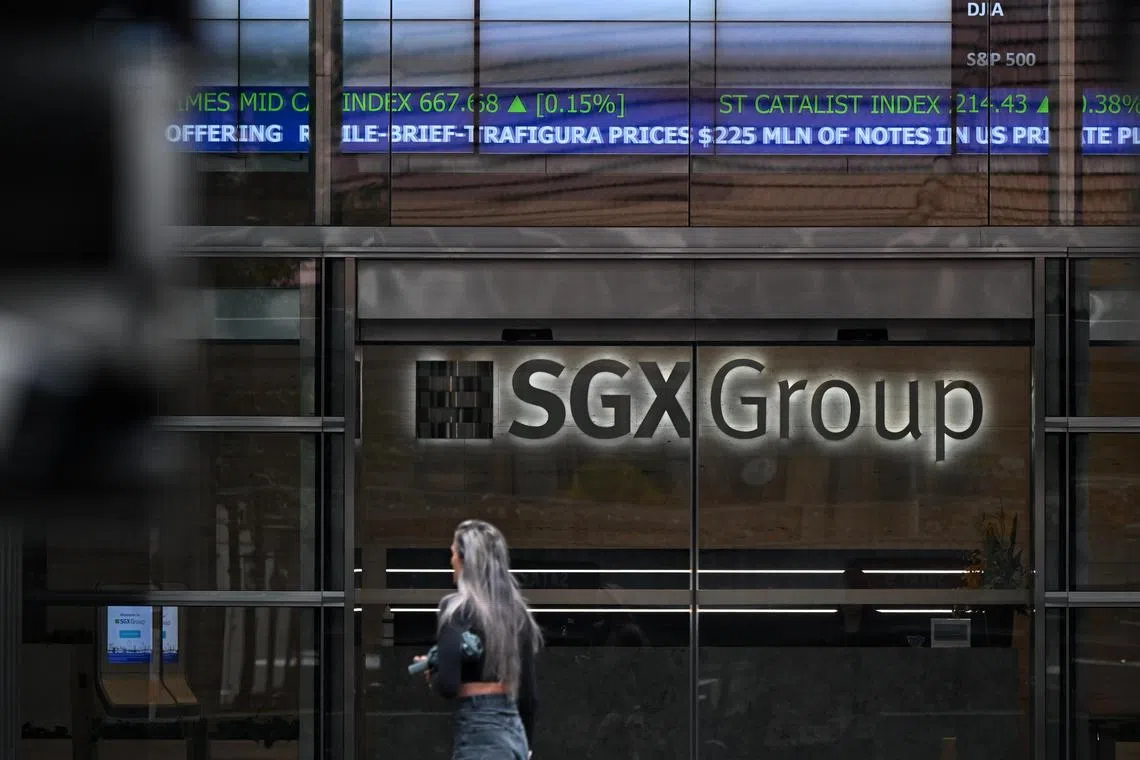Industry lauds new IFA guidelines, but says more must be done to address issue of independence
Sign up now: Get ST's newsletters delivered to your inbox

SGX RegCo’s move comes after a spate of exit offers were criticised as being too low and not in the interests of minority shareholders.
PHOTO: ST FILE
Follow topic:
SINGAPORE - Industry insiders lauded a guide released on Monday
But they agreed the new guidelines are insufficient in addressing concerns over an IFA’s independence when giving an opinion on an offer, and do not protect minority investors from bad deals.
Under current listing rules, in the event of an exit or delisting offer, an IFA must be appointed by the target company to determine whether the offer is fair and reasonable to shareholders.
The firm’s directors then make a recommendation to shareholders on whether to accept or reject the offer based on the IFA’s opinion.
SGX RegCo’s move to clarify those standards and improve the level of independence of IFAs in rendering their opinions comes after a recent spate of exit offers were criticised as being too low and not in the interests of minority shareholders.
They include the privatisation offers for Boustead Projects, Golden Energy and Resources, Global Palm Resources and Lian Beng. The original offers for all of them were revised after the Securities Investors Association (Singapore), or Sias, intervened on behalf of shareholders.
For the first time, the new guidelines set out factors that directors should take into account when appointing an IFA, such as checking that the IFA has the appropriate experience to render an opinion, and engaging the IFA on its analysis, said Sias president David Gerald.
“It is certainly helpful for the market that guidance is provided to directors on the appointment of IFAs and on setting out clearly what is expected in the contents of an IFA opinion,” he said.
Mr Ong Hwee Li, chief executive of advisory firm SAC Capital, noted that SGX RegCo’s guidelines are useful, as these are not covered in existing rules. The guidelines will help to improve the quality of the disclosure of an IFA’s assessment and opinion, he added.
Mr Robson Lee, partner at Kennedys Legal Solutions, said the new rules also set out SGX RegCo’s expectations of IFAs, including disclosure on the methodologies used and the factors and grounds that go into forming an opinion.
The IFA’s opinion must be objective and based on its professional judgment as well as substantiated with detailed analysis and disclosure on the methodologies used and the factors and grounds for forming an opinion, he said.
“Of significant importance, the new rules require the IFA to disclose any material relationships or pecuniary interests or benefits that could be relevant to the IFA’s independence in connection with the issuance of its opinion.”
Any fee arrangements that create conflict of interests, such as payment of fees depending on the outcome of the transaction, would disqualify the IFA, Mr Lee added.
But the experts agreed that the new guide is still not enough to help address the gaps relating to an IFA’s independence.
Corporate governance advocate and professor at the National University of Singapore Business School Mak Yuen Teen explained that the issue is IFAs are appointed by a company’s directors, who, in turn, are appointed by the controlling shareholders.
“It’s usually the controlling shareholders who are privatising the companies – the same people who effectively appoint the directors who appoint the IFAs,” he said.
He said what is still missing is a mechanism enabling the regulators to know if a company’s directors and their appointed IFAs are complying with the rules and sanctions that penalise those who do not.
Mr Nallakaruppan S, president of the Society of Remisiers (Singapore), suggested having the Monetary Authority of Singapore be the independent party to appoint an IFA, and said its fees should be determined based on an appropriate and transparent formula.
Meanwhile, Mr Gerald noted that as long as companies continue to trade at low valuations, minority shareholders will continue to receive lowball offers from controlling shareholders who want to privatise a company.
He warned that “the regulator can only prescribe that an offer should be fair and reasonable, but that remains a moot point so long as the regulator is unwilling to intervene to ensure that the company does make a fair and reasonable offer”.
But Mr Lee of Kennedys Legal Solutions pointed out that the new rules are meant to be guard rails against offerors using unfair means to orchestrate a desired outcome that could be prejudicial to minority shareholders and retail investors.
“The guidelines would not be a panacea to low-ball offers. Shareholders must ultimately decide for themselves if they should accept an offer,” he said.
Mr Lee said the perennial problem of low valuations and poor liquidity in the local stock market cannot be resolved by legal or regulatory means.
He added that key institutions like Temasek and GIC that invest in a number of promising global entities should work closely with the Singapore Exchange to encourage capital raising and more companies to list.
More can also be done to promote interest in the local stock market, such as providing good research and valuation reports, Mr Lee said.
Still, Mr Ong said, the guidelines and expectations set out by SGX RegCo are nevertheless good in setting a minimum standard for all IFAs.
“It is clearer on the ‘fair’ and ‘reasonable’ opinion. Over time, this will help to improve quality and disclosures of the assessments in IFA reports, which will help to improve investors’ confidence in the local stock market,” he said.

